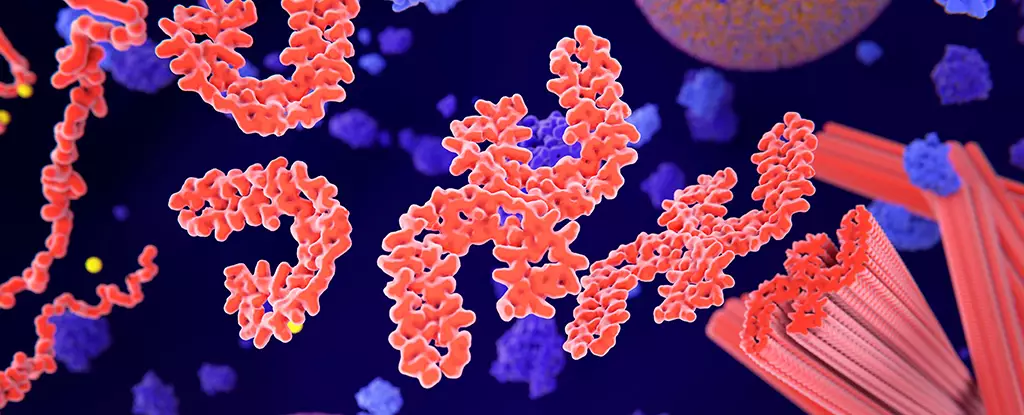Alzheimer’s disease remains one of the most challenging neurological conditions, with the pathophysiology being primarily characterized by the presence of amyloid plaques and tau protein tangles within the brain. These aggregates not only disrupt neuronal communication but also initiate a cascade of neurodegenerative events leading to cognitive decline. The impediments posed by these damaging clumps and tangles have spurred a plethora of research initiatives seeking effective therapeutic solutions. One emerging candidate is RI-AG03, a novel peptide inhibitor that targets specific aggregation sites on tau proteins.
The crux of RI-AG03’s innovation lies in its dual-target approach to tau proteins. Unlike traditional aggregation inhibitors that tend to interact broadly with multiple proteins, creating potentially harmful side effects, RI-AG03 focuses specifically on two critical regions of tau proteins known to facilitate their aggregation into toxic fibrils. According to the researchers, including neuroscientist Amritpal Mudher, the significance of this dual-targeting mechanism cannot be overstated. By blocking both “zipper” regions of tau, RI-AG03 appears to mitigate not only the formation of tangles but also the resultant neurodegeneration.
In preclinical models, notably in fruit flies and human cellular systems, RI-AG03 has exhibited promising outcomes. The fruit flies exposed to this peptide showed a remarkable lifespan increase of approximately 35 percent, suggesting that the drug holds genuine potential in modifying the course of neuronal health and longevity. These findings signify not just an incremental advancement but a transformative step in how treatments can be developed for neurodegenerative diseases.
Most existing tau aggregation inhibitors have clashed with clinical efficacy due to the unintended interference with various other proteins, leading to adverse effects that compromise patient safety. Neuroscientist Anthony Aggidis emphasizes that RI-AG03 is purposefully designed to interact with tau alone, presenting a more refined means of therapeutic intervention. This high degree of specificity highlights an evolutionary leap in the design of drugs that could revolutionize treatment approaches to Alzheimer’s disease and similar neurodegenerative disorders.
An important consideration in drug development, especially for delicate systems like the human brain, is minimizing collateral damage. Current methodologies often lack this precision, rendering them less viable alternatives. RI-AG03’s design not only signals a plausible pathway for achieving effective tau modulation but also creates a safer clinical environment for patients seeking relief from Alzheimer’s symptoms.
The journey toward clinical relevance is a multi-faceted process that necessitates further confirmation of RI-AG03’s effects in mammalian models prior to human trials. Researchers are hopeful that the results from forthcoming tests on mice will reinforce their findings. Previous tau-based therapies have met with disappointment in human trials, but the strategic targeting developed with RI-AG03 may provide a breakthrough in translating efficacy from animal studies to human applications.
A multidisciplinary approach involving computational biology, pharmacology, and neurosciences has fostered the continual evolution of RI-AG03’s development. Critics may argue there’s still a considerable distance to cover before this drug can be deemed a successful treatment, particularly in the face of persistent challenges in similar research areas. However, the proactive steps taken by the international team behind RI-AG03 herald a new era of possibilities—potentially marking a significant milestone in the pursuit of Alzheimer’s disease therapeutics.
As we stand at the precipice of medical advancement in neurodegenerative disease treatment, the dual-targeting nature of RI-AG03 illuminates a promising horizon for Alzheimer’s patients and their families. With its high specificity, potential to reduce side effects, and demonstrated efficacy in preliminary studies, RI-AG03 paves the way for a nuanced understanding of tau pathology and offers a beacon of hope that perhaps one day, cognitive decline can be effectively mitigated or reversed. The journey ahead remains pivotal and filled with the potential to change lives forever, ushering in a future where Alzheimer’s is no longer a debilitating prognosis but a condition that can be successfully managed.


Leave a Reply